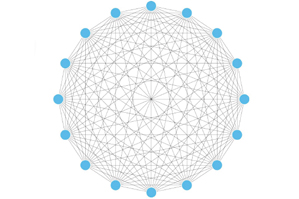Network science in a book

 I’ve written quite a bit about Network Science both here and for the News@Northeastern. And since learning the term less than a year ago, I’ve come to believe that it will be critical in the way we approach many scientific questions going forward.
I’ve written quite a bit about Network Science both here and for the News@Northeastern. And since learning the term less than a year ago, I’ve come to believe that it will be critical in the way we approach many scientific questions going forward.
Nonetheless, it remains a somewhat elusive subject. Most people (including myself) initially think “the Internet,” when they hear the term for the first time. And while it does have something to do with the Web, that’s hardly the extent of it.
Networks exist all around us, within us and between us. Network science is the study of those networks, which, according to physics professor Albert-László Barabási, a global leader in this field, have surprisingly similar characteristics regardless of their type. That is, the mathematical principles that govern my social network on Facebook look a lot like the principles that govern the network of proteins in my cells.
This is a pretty abstract concept. Which is exactly why Barabási and Northeastern’s data visualization expert Mauro Martino decided to write a book that is at once accessible to the plain old curious like me and useful to practitioners in the field.
“Information needs to be set free, particularly one that pertains to such a new and dynamically evolving area like network science,” said Barabási. “This project is our way to make it easy to learn and teach network science.”
Currently, only two chapters have been published. Like the serial novels of yore, Barabási’s book will add new chapters over the coming months, creating a living, dynamic resource that is growing in pace with the field itself. “We hope this is only the pond for an ecosystem that will grow up around it, featuring problems, translations, software, and various learning tools.”
It is designed to be viewed on the iPad, with interactive tools and examples to illustrate the points and offer the reader a full, immersive experience. But if you’re old school and poor like me, you can also downloaded it (for free, in both cases) as a static PDF.
So far I’ve found it to be a rather approachable read, and more importantly, it’s fascinating. If you’re at all curious about this emerging field that will undoubtedly change the way science is done, you should check it out. Have fun!





